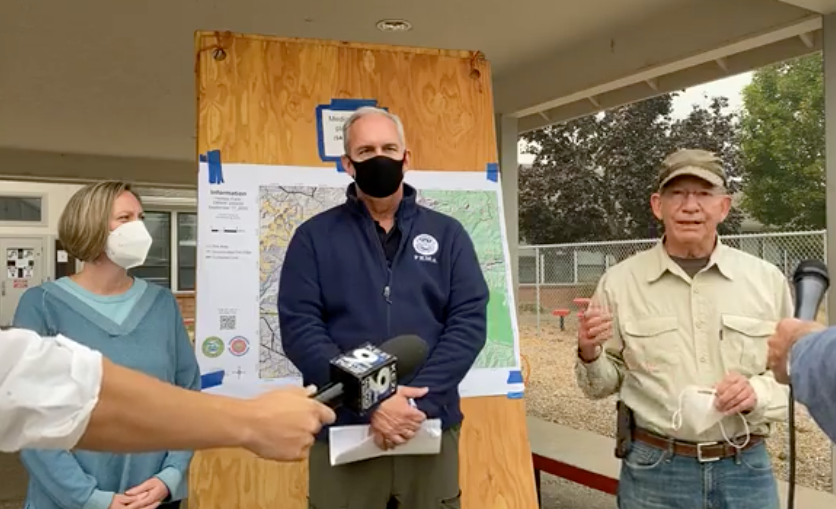In getting a firsthand look at the Holiday Farm Fire damage, Congressman Peter DeFazio visited the town of Blue River on Sept. 17, while the fire continues burning at 6 percent containment. He observed the devastation of the McKenzie River area past the fire line with Federal Emergency Management Agency (FEMA) Region 10 administrator Mike O’Hare.
“Just the scene of devastation,” DeFazio tells Eugene Weekly. “The town is totally obliterated.” During his tour, he says he saw steel girders from buildings partially melted, barriers along the road are melted and telephone poles are down. The road itself is also really hazardous.
The McKenzie corridor is devastated for many miles on both side of the river, he explains, adding that there will be months of recovery from this disaster. As congressman of Oregon’s 4th district that encompasses Lane County and the chair of the House Committee on Transportation and Infrastructure, DeFazio has jurisdiction over FEMA and the Army Corps of Engineers and can drive recovery, he says.
Right now, he is working with FEMA to focusing on the long-term recovery of the fire aftermath. DeFazio says that although evacuees are staying in hotels right now, but will need places to live in the long run. Eventually people will be moved to longer short-term housing for up to 18 months, through FEMA. DeFazio says they are looking into some lodges up the river, but nothing is set in stone yet.
One of the most important steps people can take right now is to claim insurance and to register with FEMA, which will help cover rent and eventually rebuilding costs. FEMA also has various programs for the different stages of recovery from disasters like low-interest loans. It can especially help those who may not have insurance, or who do not feel confident about their insurance.
In a press conference following the tour, O’Hare says that FEMA is working to support people affected by the fire. He says he cannot even imagine what people who have evacuated the area are going through. The approved major disaster declaration pushed forward by Gov. Kate Brown will provide a lot of funding for recovery and assistance programs.
O’Hare also explained how to register for FEMA, emphasizing that people shouldn’t wait until they are settled into a place to register for help.
“A lot of people who have evacuated. They’re scared, they’re concerned about what’s happening next. I would say to continue to listen to your local leadership about what to do, get registered with FEMA,” O’Hare says.
For now, DeFazio says, access to the road is still limited and the area is still dangerous. Though many evacuees have signed up to be escorted to their property and see damage and retrieve items, those visits have been restricted due to the forecasted rain storm.
“I’ve been around a lot of fires in my district over the years, but nothing that has taken out an entire community and hundreds, and hundreds of homes,” DeFazio says. “The McKenzie river corridor shouldn’t be burning.”
Climate change is the issue here, he says, explaining that 2/3 of the land that burned was heavily managed industrial land, and the rapid moving Holiday Farm Fire was not a case of bad forest management. But will the catastrophic Oregon wildfire season be enough to influence better climate policies?
“I’ve heard that maybe they can’t smell the smoke in D.C., but they can see it,” DeFazio says. “Hopefully this will be a game changer, but not until we get Trump out of the office.”
To learn more about FEMA disaster assistance, visit their website. Watch the press conference with DeFazio here or below.
